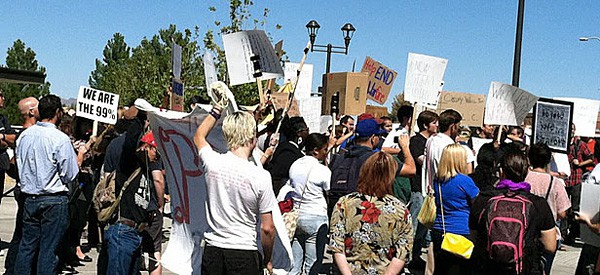
A scene from a recent Occupy march at New Mexico State University (Courtesy photo)
I appreciate the meaningful ways that the Occupy movement has moved the national conversation in a direction that can now include not only retrenchment and austerity but also basic fairness and opportunity for everyone. But they need our help.
While trying to juggle my infant son’s 4:30 a.m. feedings, keep up with the classes I take and teach, and fulfill my professional obligations, I simply don’t have the capacity to join the Occupy Las Cruces movement as they camp out in front of the Thomas Branigan Library in Las Cruces.
And — let’s be honest — I’m less willing as I get older to give up my warm home and cozy bed to endure cold nights sleeping on park grass. Either way, I’m glad that members of the Occupy Las Cruces group — and other Occupy groups around the country — are willing to endure this hardship on my behalf.

Nick Voges
But what’s OWS all about?
As I see it, the Occupy movement is concerned about a lot of things: income inequality, corporate greed, failing institutions, high unemployment and lack of opportunity, corporations run amok, free trade policies, globalization, environmental degradation, endangered personal freedoms — I could continue, but you get the picture. Most importantly, however, the Occupy groups around the country are about voicing concern over where the country is headed in general.
In that way, they very much represent the mainstream of U.S. public thought, according to a recent Pew Research Center finding. Like the TEA Party before them, the 99 percent movement has provided a full-throated, impossible-to-ignore outcry that speaks to the concerns of many Americans, including myself. To me, the most important thing that Occupy Las Cruces is doing is nominating and making real the sense — shared by many — that something is wrong with our country.
Not very precise, is it?
I don’t agree with many commentators that this is a weakness. Part of the strength of the 99 percent movement is the inchoate nature of their frustrations. After all, there’s plenty wrong with the country; what’s the point for Occupiers to argue about what exactly is wrong? Making everyone agree seems like a quick way of sapping the energy of any broad-reaching movement. It’s enough for the Occupy groups to keep saying over and over again: There’s something wrong here; there’s something wrong here.
Can they be effective?
Many people, including on this site, have argued that the Occupy movements will not be effective if they don’t develop a formal platform and begin to align themselves with like-minded organizations (conservative donors, after all, were key to helping the TEA Party movement gain national prominence). The only problem with this argument is that they’ve already been effective. As Dan Buecke from Bloomberg Business weekly points out, Google trend analyses that examine how often particular keywords are typed into their search engine show that Occupiers have greatly impacted the national conversation.
Furthermore, before the Occupy movements, the loudest voices in the debate about what was wrong with the country were TEA Party members. Now, despite initially being dismissed by the gatekeepers in both major U.S. political parties, the Occupiers have made certain that the national conversation about what’s wrong with this country not only includes TEA Party themes around debt and deficit reduction and shrinking government, but also addresses concerncs around income inequality, dwindling opportunity for American workers, and making sure that important government projects and services are protected and, in some cases, expanded.
The Occupiers, without the support of a political party or self-interested financiers like the Koch brothers, have changed the terms of the national conversation. That’s a pretty big deal.
Of course, this success doesn’t necessarily mean that the Occupy protests will successfully develop into a sustainable, long-term movement. But I’m not certain that is or even should be their goal. For now, under their current structure, the 99 percent don’t answer to national strategists and no one makes a buck off whether the movement succeeds or fails. The groups’ spontaneity and energy is part of what keeps the country paying attention. By adopting the structures and platforms of more traditional social movements, the Occupiers risk losing the very thing that makes them so compelling to so many: authenticity.
What can we do?
Say that you’re like me: You can’t occupy the park in front of Branigan Library, yet you want to show your support and gratitude to those who are willing to stand up and give voice to the fears and dissatisfactions you feel about the direction we’re heading. What can you do?
The first thing you can do is donate a little money to help pay the permit cost to stay in the park. You can do that by getting in touch with Jason Burke. His e-mail address is wldtrkey@gmail.com. You can also call him at (575) 915-2766.
The second thing to do is stop by and visit when you can. Talk with the folks down there. Listen to their concerns and share your own. My experience has been that we have many of the same values and concerns.
Again, as someone who wants to preserve — and improve — the opportunities that will be available to myself and my children, I appreciate the meaningful ways that the Occupy movement has moved the national conversation in a direction that can now include not only retrenchment and austerity but also basic fairness and opportunity for everyone. Keep it up, 99 percent-ers!
Nick Voges is the columnist behind NMPolitics.net’s Zeitgeist. E-mail him at nick@nmpolitics.net.